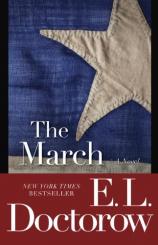The March
Review
The March
E.L. Doctorow's body of work is an impressive collection of fictionalized Americana. From BILLY BATHGATE to THE WATERWORKS to RAGTIME, Doctorow's central narrative themes have always had a uniquely American historical perspective. Now with his tenth novel, THE MARCH, he adds not only to his robust literary library but also to the growing library of work set (in whole or part) during the Civil War that includes giants such as Margaret Mitchell's GONE WITH THE WIND and Alex Haley's ROOTS.
And it may be Doctorow's most graphic depiction of a time period yet. THE MARCH is the retelling of one of the United States's most infamous military campaigns --- that of Union General William Techumseh Sherman's destructive march in the final months of the Civil War through Georgia and South Carolina. Sherman said it himself: War is hell. Doctorow has never shied away from the ugliness of life in his fiction, and his latest novel is no different. He spares nothing in his depiction of the fleeing plantation owners and newly freed slaves, of Americans terrorizing their fellow countrymen as they rape, pillage, burn, and sacrifice one another and their belongings for some higher ideal. Take lives to save lives; a classic dilemma of life and literature. THE MARCH shares horrifying images of homes being mindlessly gutted, animals being slaughtered, soldiers being tortured, all the collateral damage of war.
And while the devastation of war itself is front and center, it is the many characters' telling of the events and feeling its ramifications that grounds the story at the human level. There is fair and aptly named Pearl, the bastard child of a slave mother and white master who struggles to find her rightful place amongst the blacks and whites. There is Dr. Wrede Sartorius (who first appeared in THE WATERWORKS), the brilliant but deranged battlefield medic who eerily predicts the medical future as he precisely severs irreparable limbs.
There is also a Confederate soldier who steals a Union uniform and "joins" the North to save his own life, disregarding his former beliefs. There are freed slaves who know nothing more than to follow the rampaging military that they hope will lead them to a better life. And there is Sherman himself. Depressed, wrathful and an insomniac, he wages terror on the innocents because they are, by chance, on the wrong side of the war --- his war.
War is hell. Doctorow reminds us that the Civil War is perhaps the greatest example of man turning on man, brother on brother, in history. Doctorow takes no sides; he treats black and white, southerner and northerner, man and woman, equally. In THE MARCH, we are all equal --- that is, equally capable of inflicting the cruelest of inhumanities upon one another, equally capable of feeling loss at the core of our very beings.
THE MARCH is without doubt the story of the ravages of war, but more importantly, it is the story of man's eternal struggle with his own impulses, fears and needs.
Reviewed by Roberta O'Hara on January 7, 2011
The March
- Publication Date: September 12, 2006
- Genres: Fiction, Historical Fiction
- Paperback: 363 pages
- Publisher: Random House Trade Paperbacks
- ISBN-10: 0812976150
- ISBN-13: 9780812976151





